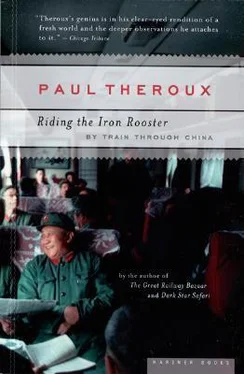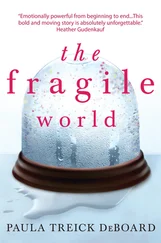There were more browsers than shoppers, which was the weirdest thing of all — people gaping at food, and salivating and moving on ("Look at those fish cheeks, Wolfgang!"), and the effect of this scrutiny and obvious hunger was of the food being used to tempt and titillate, and so it all seemed to me — and the meat especially — the most modern kind of pornography.
"Good, no?" Helmut said. "If you see that, you understand Berlin."
We were leaving the "Ke De We" when we saw a stop-press edition of a German paper saying that American planes had bombed Libya. This was in retaliation for the bombing, supposedly by Libyan terrorists, of a dance hall here in Berlin. The news had traveled fast. Already, young Germans had started to gather near the Europa Center for a demonstration, and police vans — about thirty of them — were parked just off the Kurfürstendamm. Policemen were unloading steel barricades and stacking them by the roadside.
Helmut said, "We have only recently discovered how different we are from the Americans."
He spoke with slight bitterness. I decided not to remind him of Germany's uniquely horrible history.
"I think we bombed Libya because we have been dying to bomb someone in the Middle East ever since the hostage crisis," I said. "Iran humiliated us more than any other country has done in recent years. We still haven't gotten over it. I don't think the average American makes much distinction between Iranians and Libyans. They're seen as dangerous and worthless fanatics, so why should we waste our time being subtle with them?"
'That's the way Americans think about us," Helmut said.
"Not really."
If he mentions the war, I thought, I'm going to say You started it. But he didn't. He said he found Berlin very strange and provincial; it was mostly old people and had high unemployment. He said he couldn't wait to go back to Düsseldorf.
I spent the rest of the day shopping for provisions. I bought mint tea, sherry, chocolates and antibiotics. Tomorrow we would be in Warsaw, where such things might not be available.
The demonstration began in the early evening when about eight thousand youths chanting anti-American slogans marched towards the American cultural center called Amerikahaus, behind the Kurfürstendamm. The rumor was that they planned to set it on fire. But the police, with riot shields and tear gas, massed in front of it and behind the high steel barricades. The demonstration became unruly and turned into something approaching a riot. Rioters threw stones and broke the windows of American cars, and chased tourists and anyone who looked like an American.
I missed the riot. I was at the Deutsche Oper on Bismarckstrasse seeing Don Giovanni. I had gone on the spur of the moment when, back at the hotel, I heard the members of the group arguing about the bombing of Libya, and Kicker saying: "Them fucken Arabs have been asking for that." Do I want to listen to this? I asked myself. Mozart seemed preferable.
I went alone and found it pleasant to have an empty seat next to me, an entire armrest to lean on, and to enjoy this excellent production. But after the intermission the seat was taken by a young woman, and several times in the darkness, while Don Giovanni was gasconading or Dona Anna was singing, this woman was staring at my head.
"Do I know you?" she asked, when the opera ended.
I said no.
"I have this feeling that I do. What is it?"
I sensed what it was, but I didn't say anything. Until then I had been proud of the fact that no one on the tour had the slightest idea that I was a writer — and of travel books about train trips, too. I thought it would inhibit them or else, and just as bad, provoke them to importune me ("Boy, have I got a story for you"). Some of the members of the group I had told I was in publishing, and others I had told I was a teacher. I hardly ever entered a conversation. I listened, I smiled, I made notes. When Kicker was being outrageous I blinked and shuffled away. I was the man who got up from lunch before it was over and people started talking about themselves. I was the man who was constantly drifting away — the man with no last name. I was the man with the book that you didn't want to interrupt. I was the quiet, dim, dull fellow in the old mackintosh, standing and whistling tunelessly on the platform. I agreed with everything you said. You hardly knew me — in fact, it was only when you saw me on the train that you remembered I was on the trip, and even then I was unobtrusive and faintly barmy looking, just harmlessly scribbling.
"I've seen you on television," the woman said. "Haven't I?"
"Probably," I said, and told her my name.
"Amazing," she said. "My sister won't believe this — she's read all your books."
Her name was Rachel Tickler, and I found it a relief to tell her I was on my way to Mongolia and then China — yes, to do some writing — and that I had just come from London. What was that about the States? Oh, yes, I did spend part of the year on the Cape — yes, it's a wonderful place. A far cry from this trip, which was involving me in note taking. I told her everything, I bought her some tea and we sat up late so that I could be confessional. There was no risk. Unlike the members of the tour, Rachel Tickler was a perfect stranger.
It did me a lot of good to tell her these things, because I had been so secretive on the tour it was like being invisible. It certainly wasn't much fun to be the dim, dull fellow in the mackintosh, keeping out of every conversation. Keeping quiet gave me chest pains. I longed to lecture them about the Middle East, and if they gave me half a chance on the subject of travel, I could seize their wrists like the Ancient Mariner, and a tale unfold.
Rachel herself was in Berlin working on lawsuits connected with asbestos hazards, one of the current growth areas in lawsuits. A lawyer from New York, she was attending a conference of insurance companies — reading papers and evaluating information.
Having told her everything, I went to bed strengthened in my resolve. In one sense we were like an adulterous couple — or more accurately it was like a one-night stand. It was tender and I was eager to be candid, and she was a good listener. At five o'clock the next morning I rejoined the group, and it was like being back with a lot of distant relatives.
We had taken the train to East Berlin, and changed, and were now on the Warsaw train, making a slow trip to the Polish border. Police, customs officials, soldiers — it was impossible to tell them apart — got on, examined passports, demanded to see money, scribbled receipts. Theirs was a mysterious business. They all wore old, terrifying shoes.
Poland from the train looked altogether senile — exhausted fields, decaying apartment houses, broken roads, and great, dusty factories. It has the appearance of an elderly country — it is visibly doddering — but it has the most humane and polite people I have ever met, thoroughly gentle and civilized, which is probably the reason theirs is a history of being overrun and occupied.
In my compartment was a little group traveling together — mother, daughter, grandson. They were from Katowice, and being with the daughter reminded me that young Polish women are madly attractive, with clear skin and large, limpid eyes and lovely hair.
"Don't go to Mongolia," Ewa said. "Come to Katowice and I will show you interesting things."
The mother rolled her eyes and said, "She's crazy — pay no attention to her."
Woityek the little boy was solemn faced and sat without making a sound. A Polish man offered Woityek an apple, which the little boy took but didn't eat. That was another thing. The Poles seemed to me to be very kind and courteous to each other; the Germans were less so; the Russians not at all.
Читать дальше












